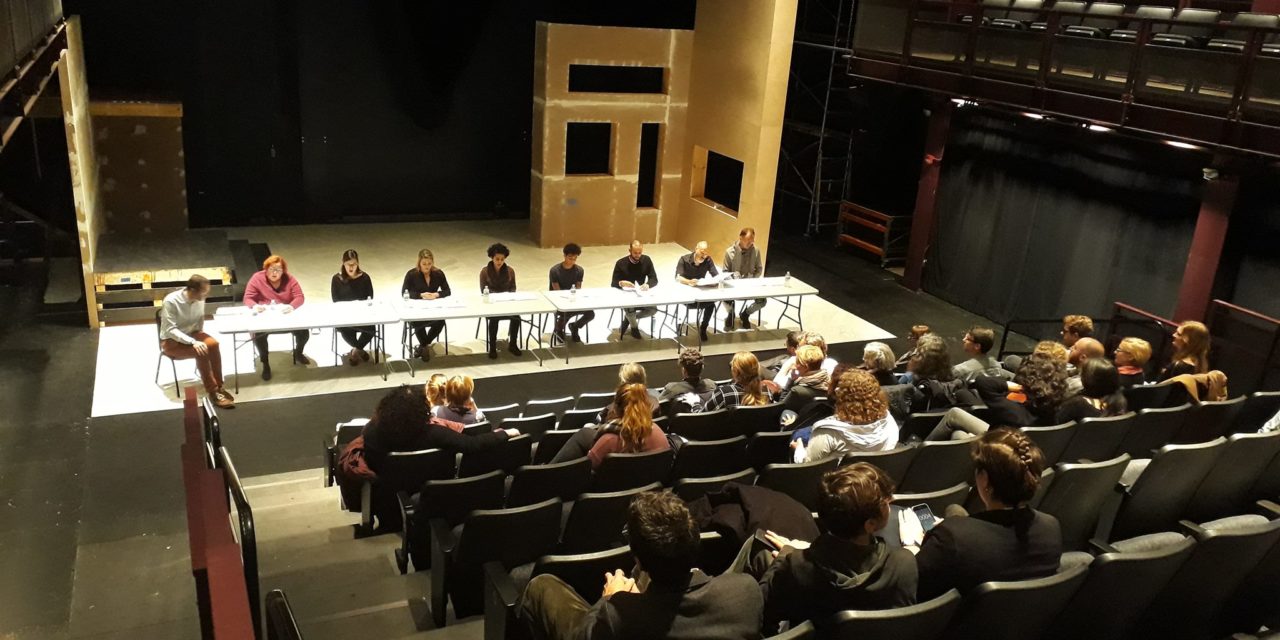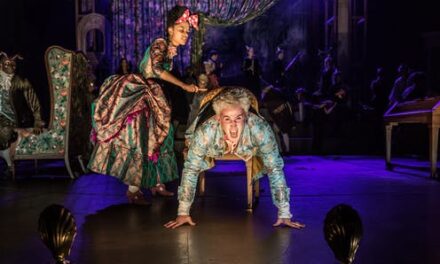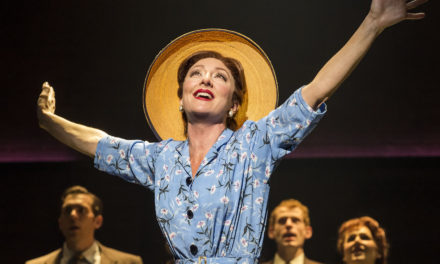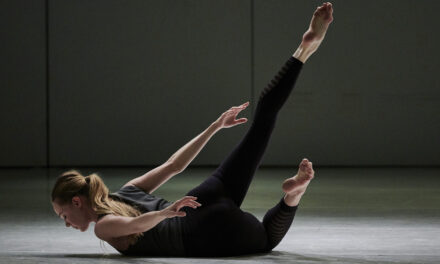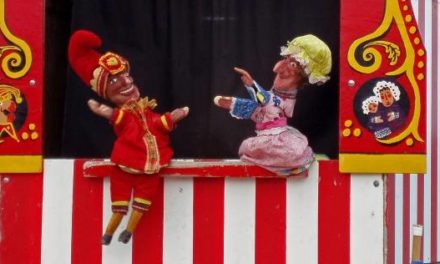In 2018, the American Literary Translators Association (ALTA) gave pride of place to theatre translation for its annual conference. Introduced here by translator Neil Blackadder, a number of the conference’s delegates offer their personal reflections on an eclectic and invigorating event in the US theatre translation calendar.
The American Literary Translators Association has been holding an annual conference since its founding in 1978. Every year–in a different city each time–literary translators gather to discuss and recognize each other’s work in panels and roundtables, bilingual readings, award ceremonies, and mingling at book fairs and receptions. For the most part, ALTA has attracted translators of poetry and prose, with drama translation showing up only on the occasional panel, and generally overlooked.
For its 41st conference (which took place at Indiana University in Bloomington, IN, at the beginning of November 2018), ALTA decided to foreground theatre translation–a departure that was well received by translators of drama and other genres alike. The organizing committee for ALTA 41–three of whose members, established US-based drama translators Neil Blackadder, Sean Bye, and Jeremy Tiang, have contributed to this article–helped craft a program that included at least one theatre-focused session during every slot over the three days of the conference. In the following paragraphs, a number of attendees and participants in ALTA41 share their personal reflections.
Translator and writer Jeremy Tiang recalls the keynote speech by Caridad Svich, a highly regarded OBIE-Award-winning playwright who has also been active as a translator from Spanish of plays by Lorca and Lope de Vega as well as many contemporary playwrights. The conference featured a staged reading of Svich’s translation of Mexican writer Hugo Alfredo Hinojosa’s play Deserts. Another staged reading involved collaboration with the Bloomington theatre company Cardinal Stage: excerpts from the translation from Yiddish of Sholem Asch’s God Of Vengeance.
Actor and translator Gigi Guizado discusses her experience of participating in an interactive theatre translation workshop by the London-based theatre company [Foreign Affars]. The organizers of ALTA 41 were especially pleased to have given the conference’s focus on theatre an international dimension, with participation from the [Foreign Affairs] and the London-based research group for Spanish- and Portuguese-language drama Out of the Wings.
Translator Sean Bye reports on a longstanding feature of ALTA conferences: bilingual readings, in which half a dozen or so translators read excerpts from an original text and their translation of it. ALTA 41 incorporated one such bilingual reading devoted to theatre (ranging from ancient Greek comedy to contemporary Chinese and Polish drama) as well as two readings in which Indiana University students performed longer excerpts from two translated plays.
Finally, translators Taylor Gaines and Sophie Stevens reflect below on some of the panels they attended and took part in at ALTA41, which explored such topics as how to deal with dialect in theatrical translation, and how to pitch play translations to theatre companies.
Jeremy Tiang on the keynote speech by writer and translator Caridad Svich
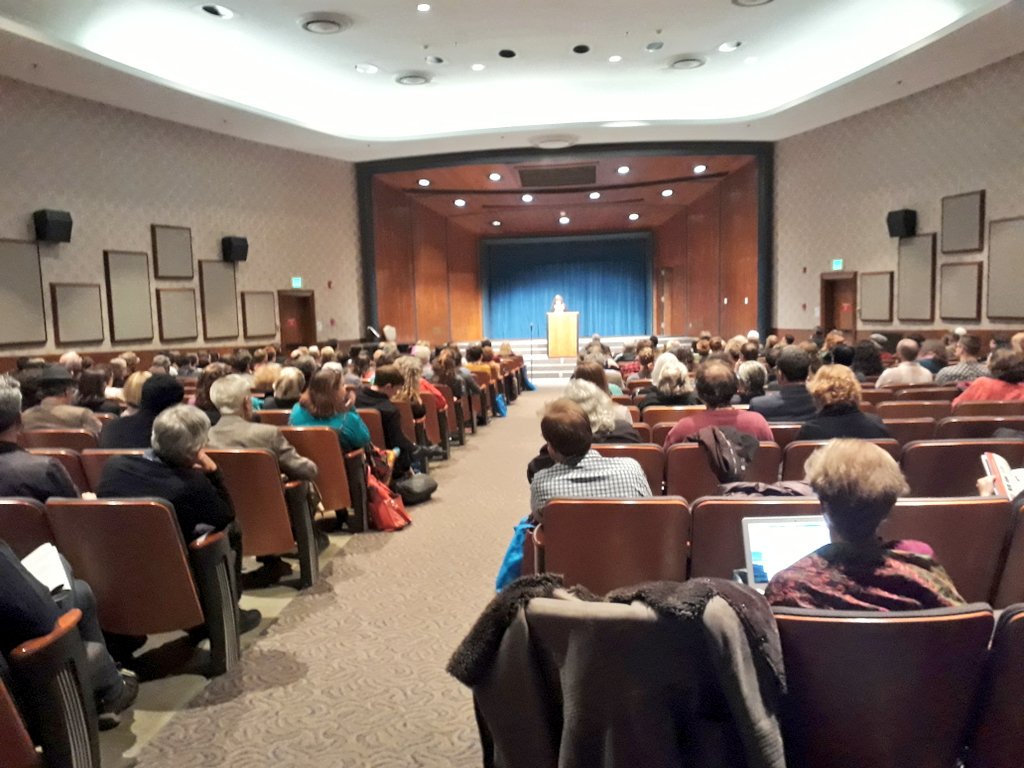
Translator and playwright Caridad Svich gives her keynote address (Photo: ALTA)
In her keynote speech, playwright and translator Caridad Svich called for more translated plays to be performed on English-speaking stages–to be “embodied,” rather than left on the page. Translation, she said, is an act of empathy, of remembrance–“three parts tenacity and determination, one part hope.” For Svich, to be a translator is to take up temporary residence in another writer’s mind, and we carry around inside us everyone we’ve ever translated every past self. She also paid tribute to the late Elyse Dodgson, and her work creating a robust network of theatre in translation.
The ALTA conference rotates between American cities, and this year was in Bloomington, Indiana. A local theatre company, Cardinal Stage, presented a lunchtime reading of scenes from Sholem Asch’s God Of Vengeance, the subject of Paula Vogel’s Broadway hit Indecent. On the set of the company’s current show–(in)appropriately enough, it was for The Christians, all stained glass and sanctified ground–artistic director Kate Galvin then moderated a discussion about the history of the play, which has also been a history of its translation between Yiddish, German, English, and other languages, moving back and forth between cultures and communities.
Sean Bye on the ALTA41 bilingual readings
ALTA has a tradition of holding bilingual readings throughout the conference, often arranged around a language group or theme. Translators read from published work or work-in-progress, in the original and in their translation. While they are a step away from the practical knowledge-sharing that goes on in ALTA’s panels, the Bilingual Readings are often some of the most rewarding programmings at the conference. On this model, this year we organized a session of Dramatic Readings, with excerpts from Classical Greek, Russian, Polish, and Chinese-language plays. Translators read their own work, often enlisting help from colleagues to read other parts.
The readings began in Aristotelian mode, with readings of Diane Arnson Scarlien’s translations from The Frogs and Women At The Thesmaphoria. Following this, Maya Chhabra read from Marina Tsvetaeva’s historical drama Fortune, offering a new angle on an author best known in the US as a poet. Next, Lauren Dubowski read from The Death Of Ophelia–a monodrama written by the turn-of-the-century Polish playwright, author, and painter Stanisław Wyspiański, presenting a unique vision of Shakespeare’s Ophelia as a woman in control of her own fate.
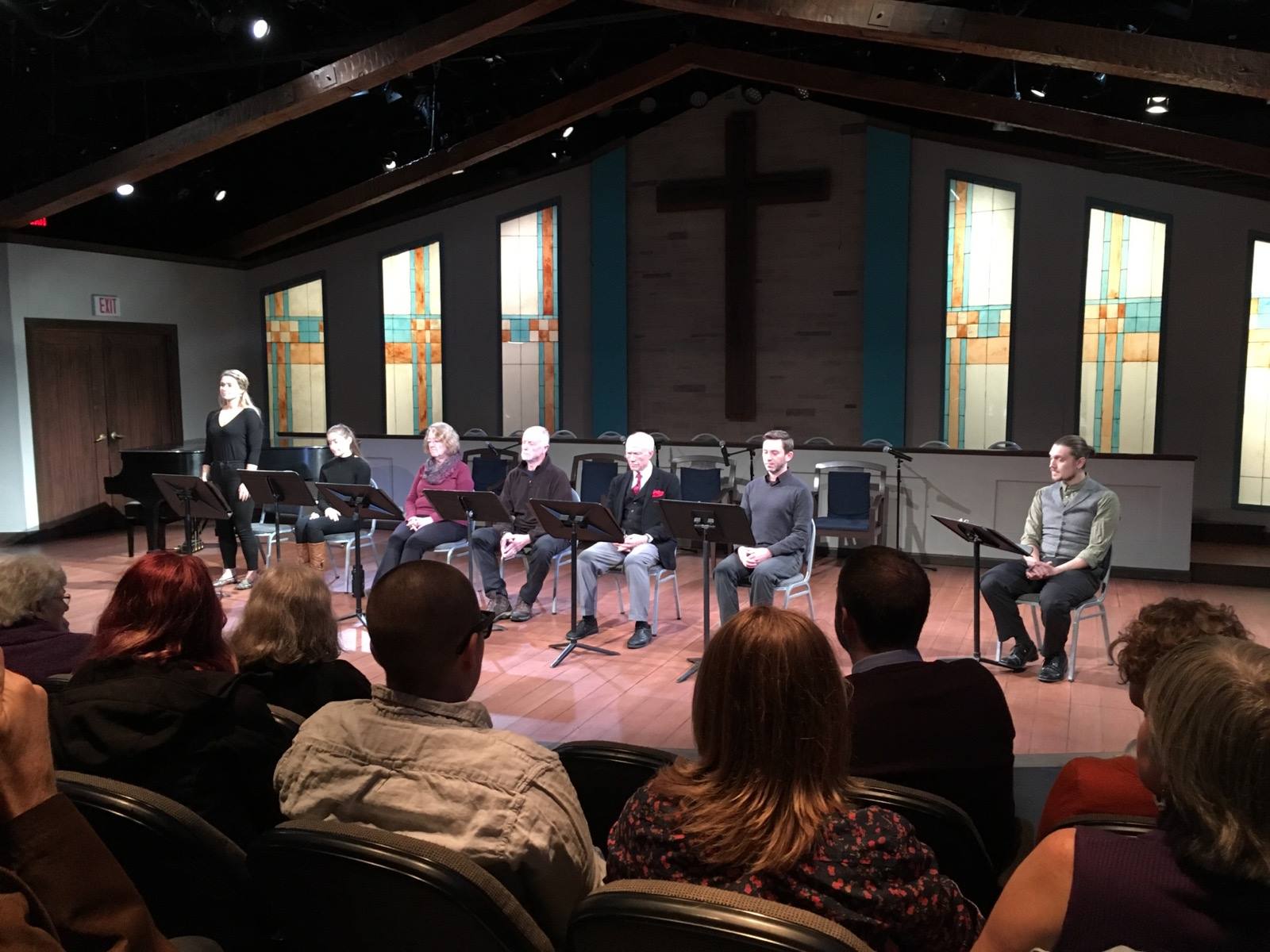
Cardinal Stage reads from Sholem Asch’s God Of Vengeance (Photo: ALTA)
Next up was Jeremy Tiang, with a scene from a contemporary play from Macau. A Gambling World by Ma Wal-in and Koh Choon Eiow presents a bizarre, dystopian, and tantalizing look at life in a city completely dominated by casinos. Following this was another dramatic work by an author better known as a poet: Letters From Our Readers by Zbigniew Herbert, a monologue of a decent man ground into dust by the Communist system, translated from the Polish by Sean Gasper Bye. The event closed with a return to Classical Greece–Keyne Cheshire’s ribald update of Euripides’ The Cyclops, titled, in his translation, The Circle Jerk.
The quality of the readings was high–many of the translators had theatrical experience–and they were well received by an audience of around 40 (a full house by bilingual reading standards). Feedback from participants and audience members alike was positive and we hope these Dramatic Readings will become a new ALTA tradition.
Gigi Guizado on the interactive theatre translation workshop run by [Foreign Affairs]
It began with an email; as have all of my adventures in theatre translation. Sometimes I’m amazed by how an electronic ping can create an intersection where distant roads otherwise wouldn’t foreseeably cross. This time, the serendipitous message came from theatre translator, William Gregory, who knew I’d be at the ALTA conference with Out of the Wings, and also knows me as an actor who “gets” translation. With ALTA’s focus on theatre translation this year, another London-based group, [Foreign Affairs] would be traveling to the U.S. to present their methods. Co-artistic director Trine Garrett was in need of actors for her workshop, Translation Centre Stage, and as we had a mutual friend in William, he made the introductions.
Trine explained, “The main focus of the workshop is introducing [Foreign Affairs]’s practice and training programme which will then be followed by a brief practical session where I am hoping to get another actor onboard. Is this of interest to you?”
Is this of interest to me? Of course! I love acting, translating, travel, and trying new things. Sign me up twice! And she did.
Trine and I got acquainted shortly before we greeted our first participants; a mixed group of technical, literary, and theatre translators working in a variety of languages. Trine started each workshop by describing the work of [Foreign Affairs] and the impact of the past two years of their page to stage theatre-in-translation program, [Foreign Affairs] Translates. Bringing translation and theatre together by immersing the participants in the nexus where those two disciplines meet is the aim of the training program, a taste of which was given in the workshop, and the theme of the ALTA conference as a whole. Together, [Foreign Affairs] co-artistic directors Camila França and Trine Garrett “have developed a creative process that recognizes and encourages the translators’ work and enhances opportunities for them to play an active part in the creative process.”
For the practical session, we paired up and exchanged brief introductions in a language we translate from. Then we taught each other to speak the intro in the foreign tongue. Easier said than done!
Then, we dove into the company’s production history by taking short scenes from two translations of related plays: Henrik Ibsen’s classic A Doll’s House (1879) and a modern sequel, Helmer Hardcore (2007) by Jakob Weis, and played with them to find new meaning and shake up new interpretations.
For starters, a brave volunteer and I did cold readings of scenes, and the group compared and contrasted the texts. We explored the sounds, rhythms, and emotions inherent in language by reading the texts en masse using consonants only, and discussing how different it was when we did the same exercise using only vowels. Lastly, pairs took turns acting out the scene but changing the setting. Each of these exercises freed the text from the confines of ink on paper and allowed us to consider additional nuances, meanings, and choices. It was, in theory, similar to what I do as a translator silently, bookishly, alone with bilingual dictionaries and a thesaurus at hand. But this was
aural, physical and communal.
[Foreign Affairs] utilizes these methods during their training program to break down barriers within developing translations, and has a larger mission of breaking down cultural and social barriers with their productions. Having the opportunity to attend ALTA and share the methods of both [Foreign Affairs] and Out of the Wings so they can inspire and enhance the work of others was a rich and rewarding adventure. I can hardly wait to see what exciting opportunities my inbox may reveal next!
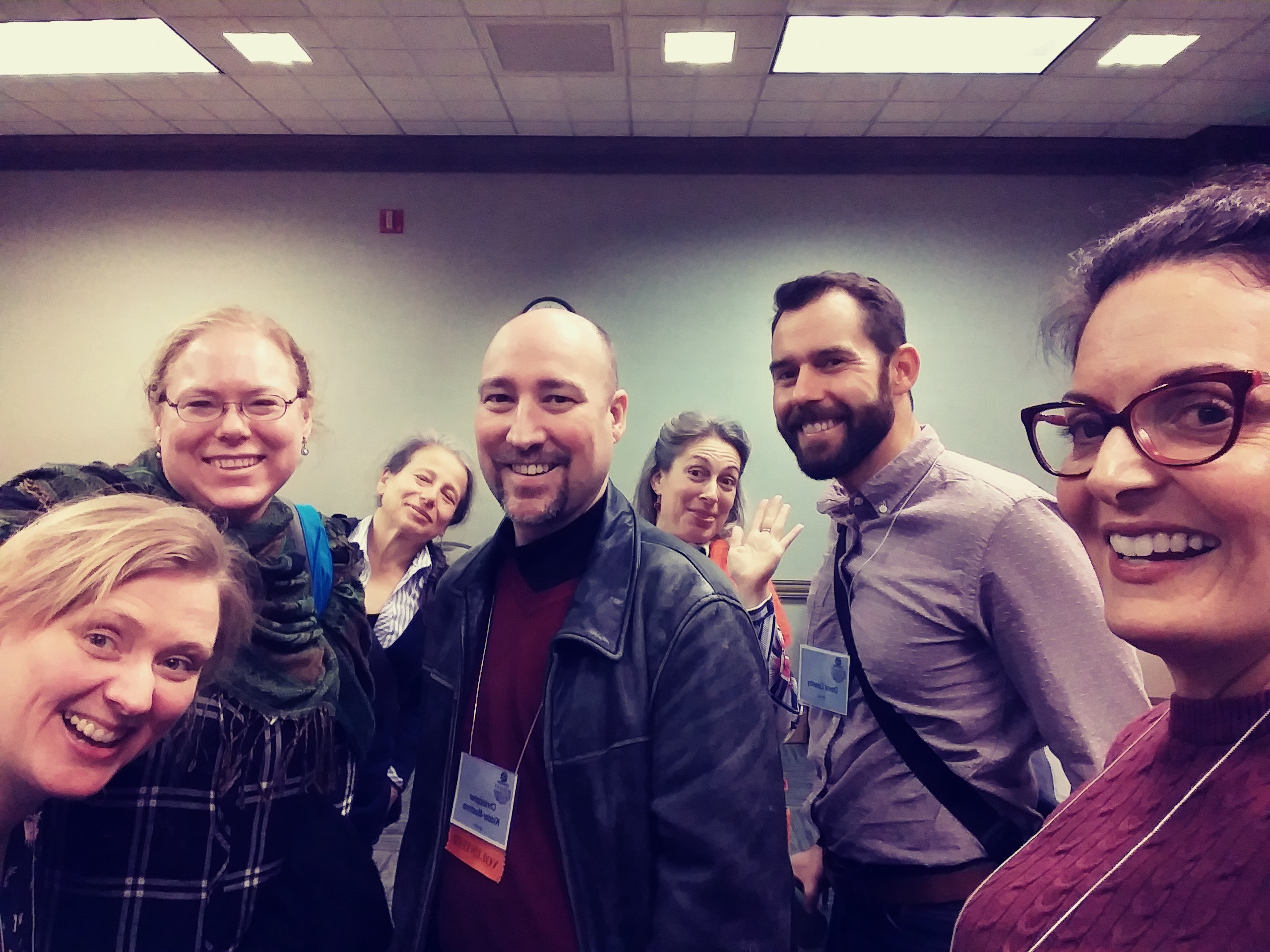
At the [Foreign Affairs] theatre translation workshop (Photo: Gigi Guizado)
Sophie Stevens on the translation and reflection of the diversity of Latin American writing.
It was my first time at ALTA and as a theatre translator, the theme of “Performance, Props, and Platforms” had been the initial draw to the conference. I was excited to share my work on translating Uruguayan theatre for a London audience as part of the Out of the Wings workshop and on the panel “Constructing Iberian and Ibero-American Identities in Translation.” When I arrived, I was instantly struck by the wide range of languages represented on the panels and at the different events. This captivated my interest and made me curious to see what I could learn from translators’ experience of working across other languages. I was delighted that, at both of the sessions I was involved in, we had an open and creative dialogue and I was able to make connections with translators from around the world working on Uruguay.
As well as the inclusion of panels and events dedicated to theatre translation, I noticed that the conference theme seemed to open up the possibility for those working on prose and poetry to discuss the performative aspect of their work. This raised questions about the role, subjectivity and voice of the translator when, for example, invited to give a reading of their English translation of a poem either alongside the author or, in some cases, reading both original and translated text. The issue of representing Latin America as diverse and multifaceted came to the fore in the panel “Translating Hyphenated Latin America” but the discussion also provoked challenging questions about how translating, and then reading aloud poetry from certain contexts might require the translator to perform a certain identity or way of speaking which isn’t their own. The role of the translator-as-performer and advocate can become even more complex when translating and presenting, for example, poetry written in prisons, detention centers or under repressive regimes.
These conflicts and complex negotiations were discussed in “High Wire Act: The Translator as Human Rights Activist” as well as the vulnerability of the translator when translating sensitive texts about repression and violence.
The discussions constantly made me reflect on the significance of the voice across all types of translation: the voice that we hear (primarily in our heads) as translators in the act of translating; those we listen to for inspiration in the target context; those we create, echo and emulate in the texts that we translate; and those that are performed aloud. The conversations at ALTA emphasized the fact that the concern for how these voices resonate when spoken in the target context is shared amongst translators of prose, poetry, and plays. Theatre’s capacity to present a range of conflicting, contrasting and complex voices presents a great challenge for the theatre translator as well as a great opportunity to engage with new and different perspectives, situations and contexts. But the translator’s own voice and subjectivity will always be present amongst these multiple voices in the creative decisions that they make, the risks that they take in choosing to translate certain texts and the innovative ways in which they make distant voices seem familiar in the target context.
Taylor Gaines on “How the Sausage Gets Made: Theatre Translation From Nose to Tail” a panel conversation between Jeremy Tiang, Trine Garrett, and Patrizia Acerra, moderated by Neil Blackadder.
Jeremy, translator of theatre and fiction from Chinese, began the conversation with the point that most plays in translation are getting readings and little else in the way of production, and that this is a problem if we want to increase the presence of translated theatre on the American stage. To that point, Neil, translator of German and French theatre, brought up the phenomenon of plays both in translation and originally in English getting “read to death”: multiple public workshops and readings which rarely result in production. Jeremy brought up how, in contrast to fiction and poetry translation, in which translators try to sell a publisher on a particular text, theatre translators find themselves needing to sell theatres on why they should produce a translation at all. This requires a
compelling response to “But we did A Doll’s House!”
Aside from the Play Company in New York, very few larger companies are consistently taking on international theatre that isn’t a tour or a transfer from the West End. Patrizia, of the International Voices Project in Chicago, and Neil brought up the tendency for theatres to see plays in translation as a risk. And the group wondered why a new play in translation should more of a risk than a new American play. The fear “What if the voice isn’t right, and doesn’t speak to the audience?” can be just as acute with a new American playwright. And the imagined tangle of rights, the relatively small translator’s fee doesn’t seem sufficient reasons to justify the dearth of theatre in translation produced in the US.
Trine discussed her model at [Foreign Affairs] in London, which brings the translator into the rehearsal room and makes more of an investment in the translator as a collaborative artist, an approach lauded at this panel and elsewhere at ALTA, and seen also by Out of the Wings, also in London, and the Lark in New York. Jeremy suggested the need to continue to push translated work at bigger theatres: if one theatre starts doing it, others will follow suit. Catherine Boyle, of Out of the Wings, who was present in the audience, expressed the idea that we shouldn’t belittle the reading as a medium of presentation, rather to work with what we have, and build a presence of theatre in translation from the ground up. The success of Elyse Dodgson’s model at the Royal Court was discussed, and how this initiative and allocation of resources to translated theatre seemed to rest entirely on her dedication, diligence, and hard work. In her passing, it is unclear if the work will continue to be done. If it hadn’t been apparent enough through repeated evocations of her memory at the conference, she is already deeply missed.
Advocacy appeared to be the word of the day. Neil discussed how he has found it more effective to strategically pitch plays to particular theatres: artistic directors need to fall in love with a play or playwright, rather than a translator’s body of work, to be able to commit to the idea of producing a play in translation. Linda Gaboriau, translator of French Canadian theatre, discussed the benefits of creating partnerships between the institutions of two countries, creating a mutually beneficial relationship in which each institution hosts playwrights and develops their translated work. This worked particularly well between the CEAD (Centre des auteurs dramatiques) in Montreal and the Traverse Theatre in Edinburgh. Patrizia brought up the need to connect with foreign consulates and bigger theatres. As a producer, she agreed that translated theatre could be harder to market, and was an especially harder sell with bigger theatres. The aversion to translated theatre may be an entrenched, but relatively baseless, aversion. Sean Bye, translator of Polish, agreed that connecting with foreign institutions might be beneficial to navigating the complex channels of funding.
It’s true that the role of an advocate would seem to be a natural fit for translators, who by their very nature are called to introduce, promote, and insist on the importance of international perspectives and global voices who wouldn’t otherwise be heard on the American stage. Whether by continuing to doggedly produce readings and small-scale productions, or by pushing for representation at larger theatrical institutions, the translator as artist and advocate cannot be underestimated.
Neil Blackadder translates drama and prose from German and French, specializing in contemporary theatre. He is Professor of Theatre at Knox College. neilblackadder.com
Jeremy Tiang writes and translates plays and novels from Chinese.
Sean Gasper Bye is a translator of Polish literature. Most recently, he contributed translations to “How to Love a Child and Other Selected Works” by Janusz Korczak (Vallentine Mitchell, 2018).
Gigi Guizado is an actor and translator of Colombian playwright Rafael Guizado, hailing from Las Vegas where she recently directed her translation of Rafael Guizado’s Canción de Cuna for TheLABlv.
Sophie Stevens is a researcher, translator, and theatre practitioner specializing in Uruguayan Theatre. She is currently working on the Language Acts and Worldmaking Project. https://www.languageacts.org
Taylor Gaines is a translator of Francophone theatre into English. Her translation of the French-language theatrical adaptation of Snow by Orhan Pamuk recently had a reading at the Segal Center at CUNY. She is based in New York.
This post was written by the author in their personal capacity.The opinions expressed in this article are the author’s own and do not reflect the view of The Theatre Times, their staff or collaborators.
This post was written by William Gregory.
The views expressed here belong to the author and do not necessarily reflect our views and opinions.

